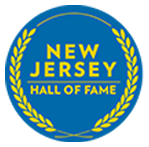Rock star, Actor, Entrepreneur, Philanthropist
Born: March 2, 1962, in Perth Amboy, New Jersey
New Jersey Hall of Fame, Class of 2009: Arts & Entertainment
Five decades into his career as a global music superstar, Jon Bon Jovi still wears his New Jersey roots as a badge of honor. And why not? He grew up in New Jersey, started his career and played some of his biggest shows here, and remains dedicated to his native state through much of his philanthropy.
Bon Jovi was born John Francis Bongiovi Jr., the son of a barber dad and a florist mom; both parents served in the Marines. Bon Jovi attended St. Joseph High School in Metuchen, but ultimately graduated from Sayreville Memorial High School in Parlin. He was only 12 when he formed his first band, Raze, and competed in a local talent contest.
Throughout his teen years, Bon Jovi fronted a series of rock bands, singing, playing guitar and honing his skills as a performer at local Jersey clubs. First there was the Atlantic City Expressway, then John Bongiovi & the Wild Ones, and then the Rest. Between gigs, Bon Jovi gained valuable experience in the music business working as an errand boy at the Power Station, a highly regarded Manhattan recording studio owned by his cousin, Tony Bongiovi.
In 1983, Bon Jovi recruited a new bassist, Alec John Such, who brought along two more new band members, drummer Tico Torres and guitarist Richie Sambora. The band also included keyboard player David Bryan, who first played with Bon Jovi in the Atlantic City Expressway. Scoring a deal with Mercury Records, the new lineup—with Bon Jovi as the band’s name–released their first two albums in 1984 and 1985. Neither was a big commercial success, but they positioned the band as opening act for tours by such major acts as the Scorpions and KISS.
Finally, in 1986, a third album, “Slippery When Wet,” cemented the band’s place in the rock firmament, spending eight weeks at No. 1 on the Billboard albums chart. A pair of No. 1 singles, “You Give Love a Bad Name” and the anthemic “Livin’ On a Prayer,” helped drive album sales well past 10 million copies. Thanks to a high-octane, arena-ready sound and fashionably big hair, Bon Jovi became the headliner for tours around the globe.
Bon Jovi’s fourth album, titled “New Jersey” and released in 1988, went to No. 1 in the U.S., the U.K., Ireland, Canada, Australia, and New Zealand. The album spawned five top-10 singles, including the No. 1 hits “Bad Medicine” and “I’ll Be There for You.” On the subsequent world tour, the band performed more than 230 shows in 22 countries, closing out the trek in June 1989 with a sold-out homecoming concert at Giants Stadium.
Over the ensuing decades, the band continued to release top-10 albums and play sold-out shows around the world, despite numerous personnel changes. Bon Jovi himself had success with a series of solo albums and enjoyed another No. 1 single, “Blaze of Glory,” his Grammy- and Oscar-nominated theme song for the 1990 western film “Young Guns II.” In all, Bon Jovi earned 11 Grammy nominations as a member of the group and as a solo artist, winning once in 2007 for “Who Says You Can’t Go Home,” his country collaboration with singer Jennifer Nettles. He later donated his interest in the song for a New Jersey tourism campaign.
With his band and as a solo artist, Bon Jovi has sold more than 150 million albums worldwide. He also has numerous film and television acting credits, starting with the 1995 comedy-drama “Moonlight and Valentino.” As an entrepreneur, he was a founder and principal owner of the professional arena football team Philadelphia Soul. His many philanthropic endeavors include JBJ Soul Kitchen, a community restaurant in Red Bank that opened in 2011. Additional locations have since opened in Toms River, on the campus of Rutgers-Newark, and in the student union at New Jersey City University.
Bon Jovi, who never attended college, received an honorary doctor of music degree from the University of Pennsylvania in 2019, and an additional doctorate from Princeton in 2021.
